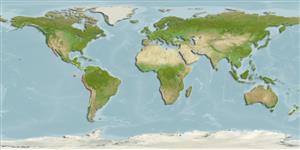>
Eupercaria/misc (Various families in series Eupercaria) >
Labridae (Wrasses) > Bodianinae
Etymology: Bodianus: Bodianus after Bodiano or Pudiano, from the Portuguese pudor, meaning modesty (Jordan & Evermann, 1896); eclancheri: Named for M. L’Eclancher (Ref. 75973).
Eponymy: Charles René Augustin Leclancher (1804–1857) was a French naval surgeon. [...] (Ref. 128868), visit book page.
More on author: Valenciennes.
Environment: milieu / climate zone / depth range / distribution range
Ökologie
seewasser riff-verbunden; tiefenbereich 5 - 46 m (Ref. 5227). Tropical
Southeast Pacific: Ecuador to central Chile. Originating in the Peru-Chile Province, it is found in the cooler waters of the Galapagos Islands.
Size / Gewicht / Alter
Maturity: Lm ? range ? - ? cm
Max length : 61.0 cm TL Männchen/unbestimmt; (Ref. 5592); common length : 40.0 cm TL Männchen/unbestimmt; (Ref. 55763)
Body moderately deep and compressed; head large and pointed; teeth elongate and compressed, resembling incisors; dorsal fin contiguous, with 12 spines; posterior rays of dorsal and anal fins forming filamentous lobes; lower branch of first gill arch with 9 to 10 gill rakers; variable, depending on size and sex; body brown, black, red or orange, but less than 5 percent of the population is entirely black (Ref. 55763).
A sequentially protogynous hermaphrodite. In the Galapagos, the colorful appearance may be due to selective pressures and their increased feeding and decreased reproductive activities may serve to avoid extraordinary predation (Ref. 9227). Adults forage on a wide range of invertebrates and algae (Ref. 28023). Oviparous, distinct pairing during breeding (Ref. 205).
Life cycle and mating behavior
Geschlechtsreife | Fortpflanzung | Ablaichen | Eier | Fecundity | Larven
Pelagic spawner (Ref. 32168). Oviparous, distinct pairing during breeding (Ref. 205). Also Ref. 103751.
Merlen, G., 1988. A field guide to the fishes of Galapagos. Wilmot Books, London, England 60 p. (Ref. 5590)
IUCN Rote Liste Status (Ref. 130435: Version 2024-1)
Bedrohung für Menschen
Harmless
Nutzung durch Menschen
Fischereien: nicht kommerziell; Aquarium: Kommerziell
Tools
Zusatzinformationen
Download XML
Internet Quellen
Estimates based on models
Preferred temperature (Ref.
123201): 16.6 - 24, mean 21.3 °C (based on 16 cells).
Phylogenetic diversity index (Ref.
82804): PD
50 = 0.5000 [Uniqueness, from 0.5 = low to 2.0 = high].
Bayesian length-weight: a=0.01230 (0.00569 - 0.02662), b=3.05 (2.87 - 3.23), in cm total length, based on LWR estimates for this Genus-body shape (Ref.
93245).
Trophic level (Ref.
69278): 2.7 ±0.24 se; based on food items.
Widerstandsfähigkeit (Ref.
120179): niedrig, Verdopplung der Population dauert 4,5 - 14 Jahre. (Preliminary K or Fecundity.).
Fishing Vulnerability (Ref.
59153): Moderate vulnerability (44 of 100).
Nutrients (Ref.
124155): Calcium = 36.5 [20.2, 58.5] mg/100g; Iron = 0.533 [0.306, 0.983] mg/100g; Protein = 18.3 [15.4, 20.5] %; Omega3 = 0.114 [0.074, 0.177] g/100g; Selenium = 37.5 [21.7, 65.4] μg/100g; VitaminA = 71.6 [21.4, 255.8] μg/100g; Zinc = 1.41 [1.03, 2.30] mg/100g (wet weight);
